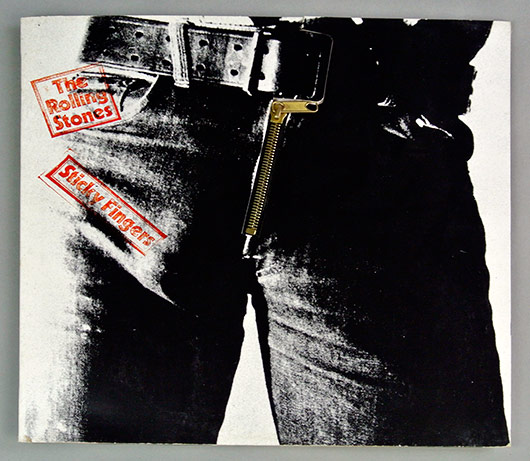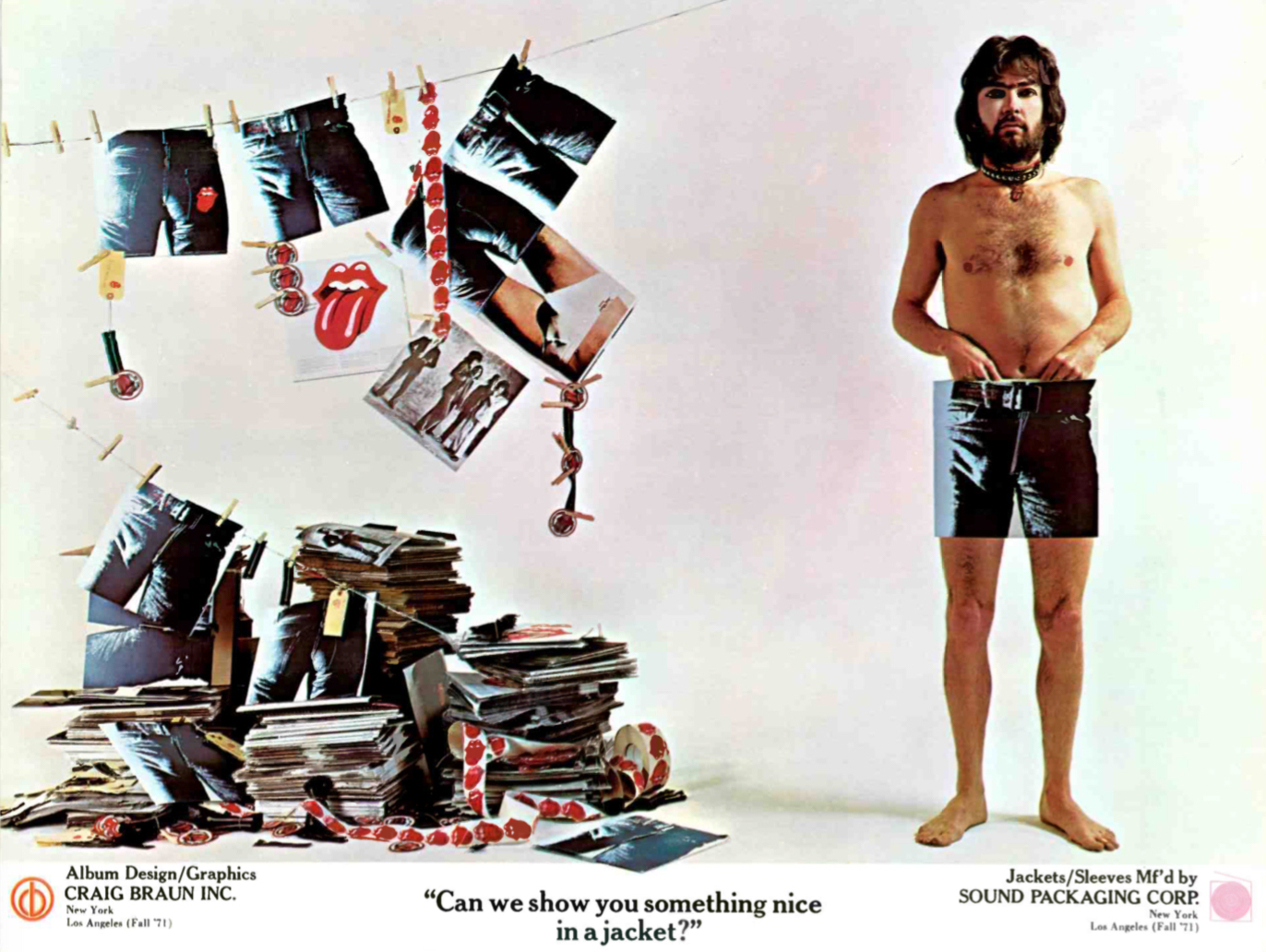 Famed for its cover of a man’s crotch in jeans designed by Andy Warhol that featured a real zipper in its first pressing – later nixed because it damaged the vinyl inside, and today a prized collectors item – the 11th American album release by the reigning “World’s Greatest Rock ‘n’ Roll Band,” The Rolling Stones, was the first to feature new guitarist Mick Taylor throughout and no tracks with Brian Jones. It yielded the #1 single “Brown Sugar” and Top 30 hit “Wild Horses,” and was eventually certified triple platinum (three million copies sold in the U.S.). One month after its April 23, 1971, release, it reached #1 in the U.S. on May 22.
Famed for its cover of a man’s crotch in jeans designed by Andy Warhol that featured a real zipper in its first pressing – later nixed because it damaged the vinyl inside, and today a prized collectors item – the 11th American album release by the reigning “World’s Greatest Rock ‘n’ Roll Band,” The Rolling Stones, was the first to feature new guitarist Mick Taylor throughout and no tracks with Brian Jones. It yielded the #1 single “Brown Sugar” and Top 30 hit “Wild Horses,” and was eventually certified triple platinum (three million copies sold in the U.S.). One month after its April 23, 1971, release, it reached #1 in the U.S. on May 22.
It was partly recorded at Muscle Shoals Sound Studios in the small Tennessee River city of Muscle Shoals, AL, and also at sessions at London’s Olympic Studios and at Mick Jagger’s rural English manor home Stargroves using the Rolling Stones Mobile recording truck.

Guest players on the album include guitarist Ry Cooder, keyboard players Nicky Hopkins (read our article on him here), Billy Preston, Jim Dickinson and sixth Stone Ian Stewart, plus horn players Bobby Keys – whose sax solo on “Brown Sugar” was one of his signature moments – and Jim Price. The album also saw the first use of the band’s soon-to-be iconic tongue and lips logo.
Watch a great live TV version from 1971
Related: What were the top-selling albums of 1971?
The crotch pictured on the cover was initially thought by fans to be Jagger’s. Instead it’s one of a number of models who posed for Warhol, the exact identity lost in the mists of history. The artist died on February 22, 1987.
Related: Photos from a promotional photo shoot for the album resurfaced over 50 years later
Related: The #1 albums of 1971
A live performance of the album is available here. Tickets to see the Stones’ 2024 tour are available here and here.


2 Comments
While this is astonishingly never spoken of, in the Stones’ early years of the 60s, with Andrew Loog Oldham producing, it’s evident from the musical precision of many of their recordings that studio players were employed, especially on their hits. With the advent of Jimmy Miller as producer, Miller employed a much more cut and paste style to their recordings, so the Stones’ actually sloshy playing could be used in pieces and stitched together to make songs, actually giving the recordings kind of a unique sound in the bargain. If you doubt this listen closely to “Street Fighting Man” and tell me if you can find one stream of instrumental sound that goes through the record. The same can actually be said, to a lesser degree, for “Brown Sugar.” And if you read the accounts of the Stones recording at Muscle Shoals (or any account of them recording actually, you’ll get the picture that they were a freakin mess in the studio — so much booze and drugs along with enough money and fame as to burn studio time listlessly, with no one to say anything about it. Those few studio players , such as Ry Cooder, and various keyboard players, who were actually credited with playing on Stones’ records will absolutely never reveal what they played or what their level of involvement actually was, and that’s the one’s who we actually know about. The really obvious indicator to this claim is the Stones’ records themselves, after Miller was no longer producing, and was replaced by Mick and Keith producing Stones’ records. These records starting in the mid seventies forward find the band’s sound and recorded creation of their songs, for the most part, to be the sloshy, loosely structured Stones we’ve gotten used to for so many decades since. Songs that are largely just punctuated by Charlie Watts turnarounds, rather than the actual shifts in song structure or musical dynamics that we heard in their records for the first 10, or so, years, when they actually had a producer who was “somehow” making them sound more cohesive. Go back and listen to “19th Nervous Breakdown” or “Get Off My Cloud.” Do you think this garage type band who created more or less the non-descript recordings of the 80s forward could actually play with the precise musicianship heard on those early recordings? And this was supposed to have been when these guys were almost kids, and relatively new to their instruments. They’ve never attained that level of musicianship, much less done it when they’ve only been playing for a few years, Bottom line is the Stones’ producers are responsible for creating all those great recordings that made them famous. How they did it, we may never find out. But at least they did have the world’s greatest R&R vocalist to work with.
I read somewhere that when Mick Taylor first went to practice with them, he said they were all out of tune and had no sense of “time”. He said they were like a garage band.